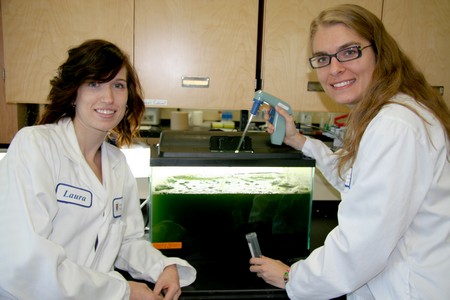 The algae that form a green slime on our lakes and waterways and that so many of us find revolting could one day be grown in giant commercial-scale tanks in Northern Ontario to produce clean-burning biodiesel for underground mining equipment, and dietary supplements such as Omega-3 fatty acids and anti-oxidants.
The algae that form a green slime on our lakes and waterways and that so many of us find revolting could one day be grown in giant commercial-scale tanks in Northern Ontario to produce clean-burning biodiesel for underground mining equipment, and dietary supplements such as Omega-3 fatty acids and anti-oxidants.
Researchers at Laurentian University and the Northern Ontario School of Medicine (NOSM) are working together on the research and hope to have a pilot plant in operation within 18 months.Xstrata Nickel could provide waste heat from its Sudbury-area smelter to sustain a growth medium for the micro-algae throughout the year and use the end product, biodiesel, to fuel haul trucks, load-haul-dump machines and utility vehicles.
An overview of the research was presented at the Canadian Institute of Mining and Metallurgy's Maintenance Engineering and Mine Operators (MEMO) conference in Sudbury October 27th.
Micro-algae, single cell organisms of between two and five micrometres in diameter, thrive on heat, light, carbon dioxide and fertilizer. Lipids, or fats, which account for 30 per cent of their body weight, can be converted into biodiesel.
The challenge lies in developing a commercial-scale bioreactor to produce sufficient quantities of biodiesel, explained Dr. Ashely Scott, a professor of bioprocess engineering at Laurentian University.
"Nobody has really produced very large scale quantities of biodiesel from this material," he said. "There are some fairly substantial units in the southern United States, in Hawaii and Israel, but most of the algae that's been grown historically has been grown for health food products."
Northern Ontario is an ideal location because of its cold climate, explained NOSM's Dr. Greg Ross, associate dean, research.
"What we have in Northern Ontario at sites like our industrial partner's is the opportunity to regulate the temperature quite accurately summer and winter. The cold is a huge asset for us because we can use it to modulate the temperature, so not only can we heat things up, but we can also cool things down" to achieve the ideal temperature of 15 degrees Celsius.
Another advantage of a cold climate is that species of algae native to high stress environments such as Northern Ontario are known to produce the most lipids and anti-oxidants. Consequently, researchers have been working with micro-algae species collected from tailings ponds at mine sites in the region.
Biodiesel offers several advantages over ethanol, which is made from sugar cane, corn and other agricultural crops, said Simon Shepherd of Advanced Insulation, a UK-based oil and gas company and another sponsor of the research.
"The predominant difference is that ethanol is produced from crops, and if you're producing crops, you're using agricultural land that would otherwise be producing food, or you're chopping down trees, whereas algae can be grown in tanks on land that is of no value."
A commercial-scale bioreactor could be thousands of feet long, but pre-pilot and pilot scale tanks would be the size of a shallow swimming pool.
"We're not going to supply the world with biodiesel, but what we will do is have specialty markets in mining, for example, where you want a clean fuel," said Scott.
Clean-burning fuels are particularly important in the underground mining industry because of the increasing cost of ventilation that's required for diluting emissions from conventional diesel fuels.
The research is funded by a $1 million grant from the Northern Ontario Heritage Foundation and $250,000 from MITACs, a Canadian research network linking businesses, government and not-for-profit organizations with more than 50 of Canada's universities. Industry sponsors include Advanced Insulation and Sussex Research, an Ottawa-based specialty chemical company. Xstrata Nickel is providing in-kind support.
The funding covers the hiring of interns, including post docs and Masters students.
The nutraceutical compounds produced from the algae would likely be sold to nutraceutical giants, who are always looking for feedstock and raw materials.
"There are a lot of people drinking red wine to get their resveratrol (antioxidants), but red wine is actually a terrible means of delivery for a nutraceutical," said Ross.
Most people get their Omega-3s from fish and fish oil, "but the fish get them from eating algae, so this cuts out the middleman and gets right to the source," said Scott.
Algae derived fatty acids would be particularly appealing to vegetarians.
Researchers at NOSM are hoping to identify other high-value chemicals that could be produced from algae. They are also working on optimizing methods of breaking down the algae to extract the chemicals and on how to produce biodiesel from the lipids.


